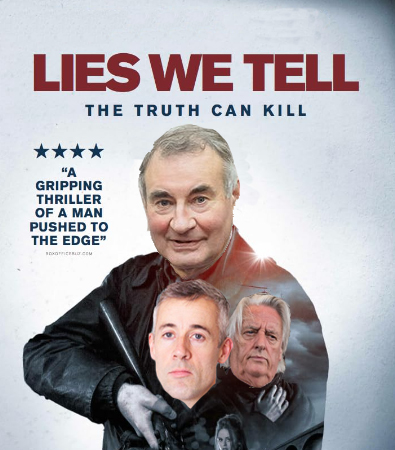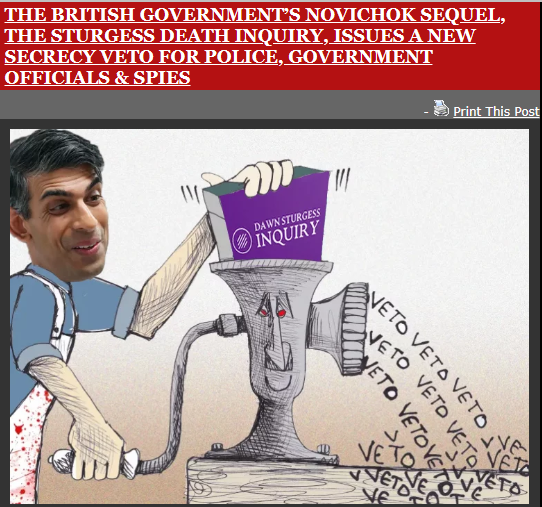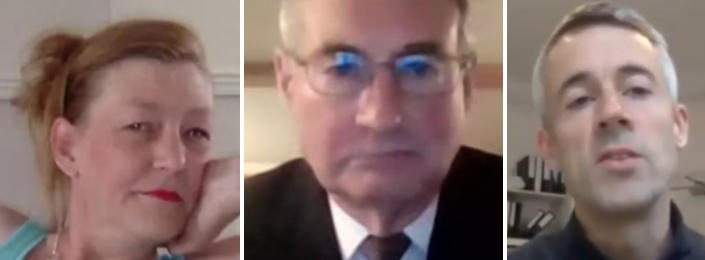

By John Helmer, Moscow
@bears_with
In a London courtroom last week, lawyers for the British government and the presiding judge, Lord Anthony Hughes (lead image, centre), revealed they will resist the efforts of the Dawn Sturgess family to obtain a multi-million pound settlement in compensation for what they claim, and the government says, was her death five years ago from Novichok poisoning by Russian state agents.
Secrecy is the key, not only to the big money claim, but to the government’s aim to defeat it and at the same time preserve the official story that the Kremlin ordered and carried out the chemical warfare attack in England in 2018.
Lord Hughes is defending the government’s effort to keep secret enough of the evidence in the case to block Adam Straw KC (lead image, left) and Michael Mansfield KC (right), the Sturgess family lawyers, from demonstrating that the British security services should have known in advance – and did know enough — to have protected Sturgess from the Russian cause of her death. Their argument has been that for this negligence a very large sum of money should be paid to Sturgess’s heirs, to Rowley, and to the lawyers.
The judge, the government, and the lawyers have agreed, however, there is one secret they must all keep. Sergei Skripal, the original target and survivor of the Novichok attack allegations in the official narrative, must never be allowed to testify publicly to what he knows.
To cover this up, Straw, Mansfield, and a lawyer representing the British press lied in court last week, claiming they want “open justice” from the secret services and the police. According to Jude Bunting KC representing the media, “open justice is about avoiding ill-informed speculation about proceedings and, insofar as material is in the public domain because of assertion, or even because of state-sponsored [Russian] misinformation, that is all the more reason for disclosing that material in open rather than in closed.”
Hughes claimed to be seeking the same openness. “One of the difficulties of this inquiry and this case…is that everybody popularly supposes that they know the answer. They may or may not be right, but the purpose of the inquiry is to find out.” Hughes was pretending.
Dawn Sturgess died of heart failure on June 30, 2018, in the apartment of her partner, Charles Rowley, at the Wiltshire county town of Amesbury. She was kept alive at Salisbury District Hospital until July 8 while police searched the apartment for illegal drugs and interviewed local drug dealers who were at the apartment with Sturgess and Rowley the evening before. On July 11, the police reportedly discovered a perfume bottle on the kitchen table; two days later its contents were publicly revealed to contain Russian-made Novichok.
For the full story, read the book published in March 2020, and since then the archive of investigations of the medical evidence fabrication.

Source: https://johnhelmer.net/
Adam Straw, nephew of the former Russia warfighter at the Foreign Office and Home Office, Jack Straw, told the hearing on September 6 there should be more open disclosure by the British intelligence and security services in order to prove the Russians had murdered Sturgess, his client, after failing to kill the Skripals. The hearing ran for two hours before going into secret session. Read the verbatim transcript.
“The Russian state has been spreading disinformation,” Straw declared, referring to denials of Russian involvement in the alleged Novichok attacks.
“Those motives are factors which can cause serious risk to the UK and to the UK’s national security. They include the motive of undermining western democratic governments. Now, the more this inquiry is able to put forward a convincing counter-narrative, so the more that convincing reasons and evidence which support your ultimate conclusions can be put in the public domain, the more likely it is that this inquiry will undermine that Russian disinformation campaign, and this inquiry will be capable of obstructing those malign motives be able to give relevant evidence as to what happened in the UK, and therefore at least a significant chance that hearing evidence in public may prompt other people to come forward and give evidence about it.”
“From the very beginning in this case, there have been assertions without evidence to back them,” Hughes responded.

Left to right: Dawn Sturgess, Anthony Hughes, Adam Straw. Hughes has been paid £17,446 for his first year’s work as chairman of the inquiry; the lawyers assisting him have received £693,597 for their work. Straw was one of two lawyers representing the recent claim in the European Court of Human Rights by Marina Litvinenko, widow of Alexander Litvinenko, that he had been poisoned by Russian agents in London in 2006.
Appearances can be deceiving.
Hughes appeared to be saying the role of the Russians in the Novichok attacks remains to be proved in the official inquiry he is leading. But the retired judge was not saying he intends to open and investigate the evidence that Sturgess did not die from Novichok, or that the Russians did not plant the poison at the Skripal house in Salisbury, or that they did not dispose of the poison where it was later retrieved by Rowley and given to Sturgess. The website homepage record of the Hughes inquiry has already come to judgement on these points: “Dawn Sturgess was pronounced dead at Salisbury District Hospital on 8 July 2018. The post mortem indicated the cause of her death was Novichok poisoning.”
Hughes, following the two coroners before him over the past five years, will not be investigating the clinical and witness evidence that the first post mortem of July 9-10, 2018, did not identify Novichok as the cause of Sturgess’s death. That didn’t happen until a second post mortem had been carried out and a new report issued on November 29, 2018.
This is evidence which the Hughes inquiry has been set up to keep secret – secrecy which would be impossible if the cause of Sturgess’s death were investigated in an inquest in a coroner’s court, under the open and sworn testimony requirements of British coronial law.
Years of publication of evidence on the difference between the two post mortems, and of evidence discrediting the official government, secret service, police, and media versions of the alleged Novichok attacks have also been excluded from the inquiry, according to an 81-item catalogue presented in court last week, entitled “Table of Open Source Material”. Dominating this list is evidence published by the British and NATO-funded propaganda outlet called Bellingcat; the state broadcaster BBC; and the Guardian newspaper.
Hughes didn’t notice anything was missing in the “open source” catalogue. “I don’t know who prepared it [sic], but the schedule of open source material is extremely helpful and I am very grateful to whoever did it. For the most part, though not always, the contents of the right-hand column do enable you to work out something about the source and the source is obviously critical.”
The catalogue had been prepared by lawyers for the Sturgess family under Straw and Mansfield. The British government’s lawyer in the courtroom said she too was as satisfied as the judge: “In terms of the family’s table, of course we agree it is enormously helpful.”
The opposing sides in the London courtroom also agreed on a source of evidence in the case who is more important than the “open source” catalogue. This is the witness who knows more about the Novichok attacks than the British government, police investigators, Wiltshire county coroner, the regional ambulance service and fire brigade, and the Salisbury hospital doctors and nurses, will not be allowed to testify to the Hughes inquiry, not in public and not even behind closed doors. This witness is Sergei Skripal who, with Yulia Skripal, has been granted “core participant” status in the proceedings by Hughes, and who is purportedly represented in court by a London lawyer named Adam Chapman.
Sergei Skripal may be dead, however; he and Yulia Skripal have not been permitted by their British guards to contact the outside world for several years – since June 2019 for Sergei, since November 2020 for Yulia.
Instead of their silence, Hughes, the state lawyers, Straw and Mansfield argued at length in the courtroom last week over the refusal of the security services to admit Skripal had been one of their double agents when he had been serving in GRU, the Russian military intelligence agency.
The Home Office lawyer told Hughes: “As you have already said repeatedly sir, as a matter of policy, the government does not confirm or deny whether anyone is or has been an agent. Confirming that a person is an agent may put that person at risk; confirming that a person is not an agent may put someone else at risk. That risk may very easily be a risk of death. As importantly, and indeed, sir, you have already alluded to the fact that the NCND [neither confirm nor deny] principle, neither confirm nor deny, exists for the protection of others, not necessarily those who are the specific subject of an application. Potential agents will not work for HMG [His Majesty’s Government] if they think their identities may one day be revealed in a court or inquiry; and if people will not work for us, then vital intelligence that keeps this country safe will be lost. The NCND policy works only if it is consistently applied.”
“Yes right”, Hughes said, sidestepping to another issue.
According to Mansfield, the hearsay evidence of what Sergei Skripal allegedly told a BBC reporter named Mark Urban, and Urban reported in a book, should be believed about his work for British intelligence as a double agent.
Hughes replied: “I simply don’t know whether it [the book] is right or wrong, but it is assertion without either evidence or source.”
Mansfield insisted: “Yes. We say that is very different to the, we say, first hand reporting by the man himself.”
It didn’t occur to Hughes to announce, nor to anyone in his courtroom to say, that Skripal should be called to testify himself “first hand”.
Mansfield proposed the court accept the evidence of Bellingcat instead. “It is extraordinary how this organisation which is not official happens to have hit all of the right nails, and that is Bellingcat. Bellingcat put out a lot of information, much of it related to mobile metadata. They are claiming that it is the mobile metadata that allowed them to name publicly who the third suspect [Russian GRU agent] was — and in fact they are naming a fourth as well — and they did this before the Metropolitan Police or any other police force was able to indicate who the third suspect was.”
Preliminary hearings will continue behind closed doors for Hughes to decide what evidence will be excluded from release. The judge and the lawyers have now agreed that the target date for their open public inquiry to open publicly is October 2024.
NOTE: Not a single British press account of the September 6 hearing reported that if Sergei Skripal is alive, he is capable of testifying to the inquiry, not only about which side he has been spying for, but on what really happened to him on March 4, 2018. For evidence of the mental breakdown of the British reporters who attended the hearing, read the BBC account; the Independent; Salisbury Journal; and the Guardian. For a fresh report from the Swindon region fire brigade that there was no Novichok at the Amesbury address when their decontamination unit checked and tested the apartment after Sturgess’s and Rowley’s hospitalisation, read this.











Leave a Reply